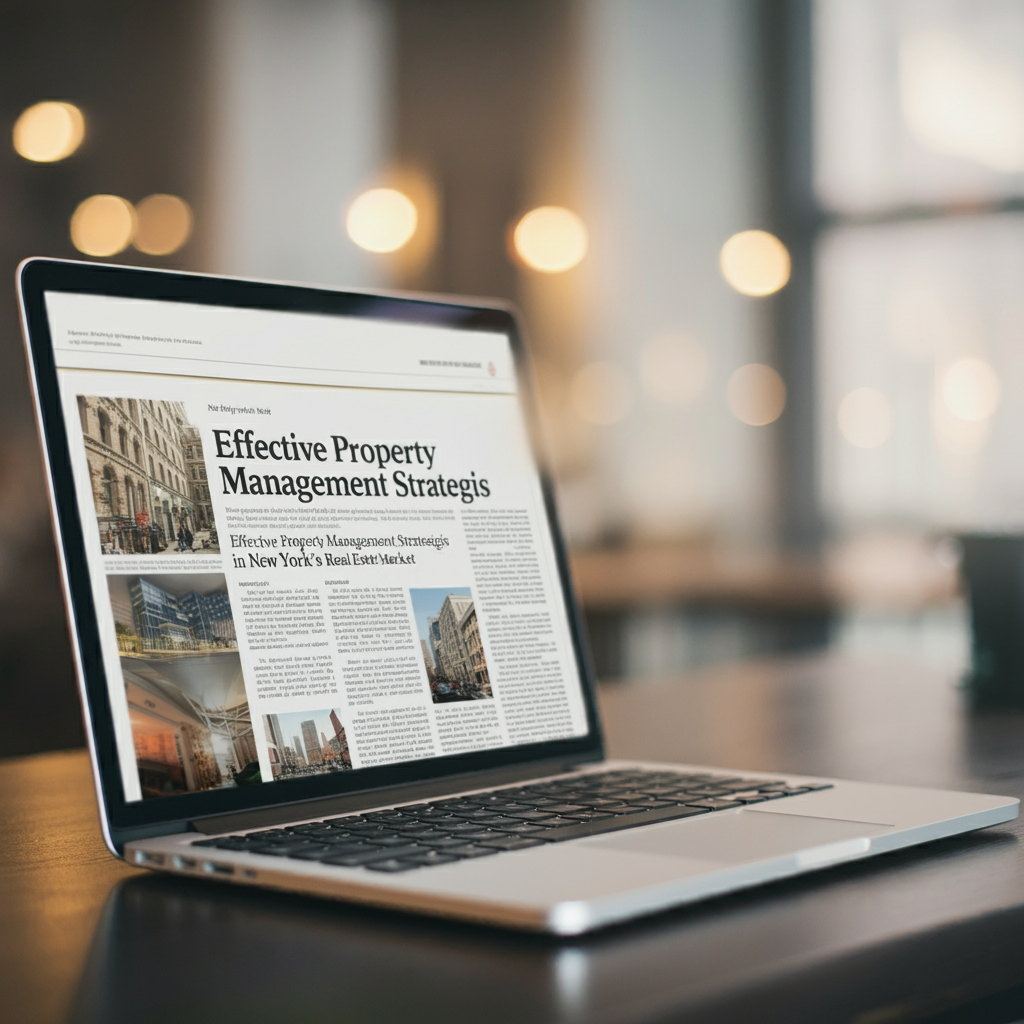Effective Property Management Strategies in New York’s Real Estate Market
1. The Vital Role of Strategic Property Management
New York’s dynamic real estate market, spanning vibrant neighborhoods from Brooklyn to Long Island, demands strategic approaches in property management. The success of a property hinges not just on its location but also on the efficiency of its management practices. Effective property management involves decisions like whether to keep frontline staff in-house or outsource them, and how to manage leasing responsibilities optimally.
Insight: Research indicates that properties managed in-house often maintain higher tenant satisfaction due to more direct service delivery and quicker response times. Yet, outsourcing can provide cost efficiency and specialized expertise.
For landlords and real estate investors in areas like Queens or Nassau County, aligning property management strategy with market expectations is key. Contact Renovation Services at 347-455-1741 for bespoke property management solutions.
2. Leasing Strategies: Centralized or Decentralized?
Leasing is a critical component of property management, and the approach taken can significantly impact profitability. Some real estate firms centralize leasing, appointing specialists who focus exclusively on tenant acquisition. Others assign leasing responsibilities to property managers, who are familiar with the nuances of the building and tenant history.
Example: In Manhattan, where competition is fierce, centralized leasing has proven effective in maximizing occupancy rates and providing a seamless tenant experience. Conversely, in quieter areas like Staten Island, a decentralized approach allows for personalized service and stronger tenant relationships.
Both strategies have their merits, but the best choice often depends on the type of property and the target market. For more information, visit HUD.gov for resources on effective property management practices.
3. Outsourcing Versus In-House Management: Weighing the Options
Outsourcing property management can reduce administrative burdens and leverage professional expertise. However, maintaining in-house teams can offer greater control over operations, especially for properties requiring frequent maintenance. In Long Island’s Suffolk County, where rental properties vary from urban to suburban, this decision must be made with care.
Data Insight: According to the U.S. General Services Administration, outsourcing certain maintenance tasks can reduce operational costs by up to 30%, but it may also lead to less personalized service.
Property owners must assess their goals and the needs of their tenants when making this decision. For expert advice, get in touch with Renovation Services.
Top 10 Tips for Enhancing Property Value in NYC
Frequently Asked Questions
Q1: What are the benefits of in-house property management?
A: In-house management provides more direct control and often results in better tenant satisfaction and service.
Q2: How does outsourcing affect tenant relationships?
A: Outsourcing can streamline operations but may reduce the personal touch that in-house teams offer, affecting tenant retention.
Q3: Which strategy works best in Brooklyn’s real estate market?
A: In Brooklyn, a mixed approach often works well, with in-house teams handling leasing and outsourced services managing specialized tasks.
Q4: Are smart building technologies worth the investment?
A: Yes, they improve operational efficiency and are highly appealing to tech-savvy tenants, especially in NYC’s modern rental market.
Q5: How can property owners maximize leasing potential?
A: Focus on market research, provide flexible lease terms, and maintain high property standards to attract top-tier tenants.
Q6: What maintenance tasks are best outsourced?
A: Tasks like HVAC servicing, elevator maintenance, and landscaping are often best outsourced to ensure professional handling.
Q7: Does property management strategy affect property value?
A: Absolutely. Strategic management directly impacts tenant satisfaction and retention, which in turn affects overall property value.
Q8: What security features are essential in New York?
A: Gated access, surveillance cameras, and 24-hour on-site security are highly recommended for urban properties.
Q9: How often should property assessments be conducted?
A: Annual assessments are ideal to catch maintenance needs early and ensure compliance with city regulations.
Q10: Are there government incentives for property upgrades in NYC?
A: Yes, there are various tax incentives and rebates for energy-efficient upgrades. Check out NYSERDA for the latest information on state-level programs.
4. The Impact of Technology on Modern Property Management
Technology has revolutionized property management, especially in competitive markets like Manhattan and Queens. Smart building technologies, from automated lighting to mobile tenant portals, have become a standard rather than a luxury. These systems improve efficiency, reduce operational costs, and enhance tenant experiences.
Example: Properties in high-tech hubs like Long Island City benefit significantly from features like automated energy management systems, which can reduce utility costs by 20%.
Implementing these technologies requires upfront investment but delivers substantial long-term savings and attracts tech-savvy tenants. For assistance with integrating smart solutions, contact Renovation Services.
5. Effective Communication Strategies for Property Managers
Clear and proactive communication with tenants is essential. Whether addressing maintenance requests or sending out policy updates, efficient communication can make a significant difference in tenant satisfaction. Utilizing digital communication platforms, like tenant apps, can streamline this process.
Tip: Implementing a tenant portal allows residents to pay rent, submit maintenance requests, and receive community updates with ease.
Especially in fast-paced environments like Brooklyn, where many tenants are young professionals, offering multiple communication channels (such as text, email, and app notifications) ensures everyone stays informed. Investing in a robust communication system will boost tenant retention and satisfaction.
6. Regulatory Compliance in New York Real Estate
New York has some of the strictest property management regulations in the country. From rent stabilization laws to building safety codes, staying compliant is crucial. Regular audits and staying updated with the latest legislation are necessary for property managers.
Resource: Refer to the NYC Department of Buildings for guidelines and updates on building codes and safety requirements.
For properties in boroughs like Queens and Staten Island, special attention must be paid to zoning laws and environmental regulations, particularly for new developments. Non-compliance can lead to hefty fines and potential legal issues.
Renovation Services offers compliance consulting to ensure your properties meet all necessary standards. Reach out for expert guidance.
Additional Tips for Streamlining Property Management
More Frequently Asked Questions
Q11: What are the top safety features tenants look for?
A: Key features include 24-hour surveillance, secure entry systems, and well-lit common areas. Properties in high-crime areas may also benefit from hiring security personnel.
Q12: How can property managers in Long Island stay competitive?
A: Focus on offering unique amenities, maintaining excellent curb appeal, and staying flexible with lease terms to cater to different tenant needs.
Q13: How does property management software improve efficiency?
A: It automates routine tasks like rent collection, maintenance tracking, and communication, freeing up time for managers to focus on strategic goals.
Q14: Are there specific regulations for historic properties?
A: Yes, historic buildings in NYC are subject to preservation laws. Consult the Landmarks Preservation Commission for guidance on permitted renovations and alterations.
Q15: What are the benefits of offering flexible lease options?
A: Flexible leases can attract tenants who are hesitant to commit long-term, making your property more appealing in a competitive market.
Q16: How can property managers reduce energy consumption?
A: Invest in energy-efficient appliances, install LED lighting, and use smart thermostats to manage heating and cooling effectively.
Q17: What steps should I take to prevent tenant turnover?
A: Regularly check in with tenants, address complaints promptly, and offer incentives for lease renewals, such as rent discounts or upgrades.
Q18: Is renters’ insurance mandatory for tenants in NYC?
A: While not legally required, many landlords make renters’ insurance mandatory to protect both parties in case of emergencies.
Q19: How can properties in Queens improve marketability?
A: Highlight proximity to transit hubs, diverse dining options, and cultural landmarks in marketing materials.
Q20: What should I include in a tenant welcome package?
A: Include essential information about the property, local resources, contact details for emergencies, and small gifts like a welcome plant or gift card.






